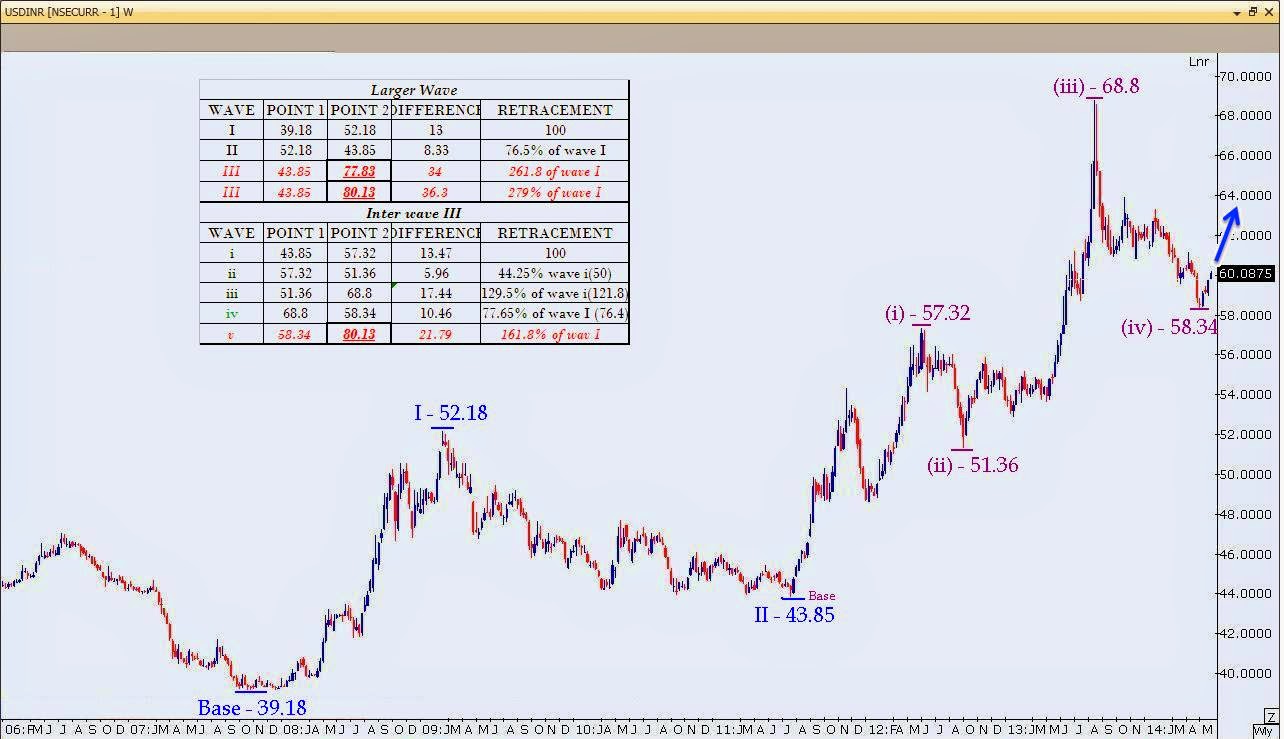USD/INR Buy CMP 60.1 Stop
@ 58 TGT 64 – 68 – 72 – 76 – 80
The basic pattern of the Elliott wave
principle, how price moves not in a straight line but in a series of
rises and retracements. Except for unusual circumstances, price moves in
waves and not in a straight-line run. These waves are like the tide coming in.
Price advances and recedes, advances a bit more and recedes, slowly creeping up
the shore.
USDINR
from the above weekly chart from 30th November bottom of 39.18
started the rally where it tested the higher level of 52.18 in market 2009
where the top was posted. This was the first wave in the long term uptrend
where the rise in price was seen by 13 Rs. After testing the level of 52.18 corrections
in the form of wave II was seen and rupee retraced from 52.18 to 43.85 which
was 64.07% which was near to 61.8% level, which confirm correction was over and
it entered in wave III on 29th July 2011 which is still in continuation.
In the wave III we are looking at the inter wave formation where the inter
wave, the formation of wave (iv) is near to over and is entering in wave (v)
which is starting from recent bottom of 58.34 level. In the graph it is clearly
shown the movement of wave (iv) and the expected wave (v) can retrace by 161.8%
of wave (i) which comes to 21.79 points move from 58.34 and can move and test
the level of 80.13 level on higher side. This expected level of 80.13 will complete
the inter wave (v) and also the completion of wave III in larger wave. Wave III
might either close near to 77.83 which comes to 161.8% of wave I or 80.13 which
is 161.8% of wave (i) from bottom of wave (iv); where we can conclude wave III
in larger wave can come to end near to 78 to 80 range there after wave IV can
come in to picture.
Over here
we expect wave IV to retrace by 61.8% of wave I which will test 72 from the higher
level of 80.13 and thereafter from the lower level of 72 will enter in the wave
V moving and testing the level of 93.03 which is calculated on the basis of
161.8% of wave I from the bottom of wave IV and will halt around that level
before entering in corrective formation of A-B-C wave.
o
Rule:
·
Wave III must be 1.5 & 3.5 times
Price of wave I; Wave III must be 1 to 4 times the time wise by wave I; Wave
II and wave IV usually alternate between
·
Zigzag and Flat. The other
alternative is between a Triangle and a Flat. Wave V will usually move beyond
the end of wave III.
·
When Wave 5 is extended (more than 161.8% longer than both Waves
1 and 3) a point within Wave 4 will often divide the entire Impulse Wave by
1.618.
·
It is unusual for Wave 5 to travel a greater price or time
percentage than Wave 3 traveled in its entirety.
·
One of the Impulse Waves (Waves 1, 3 or 5) generally extends (at
least 162% times the next longest Impulse Wave).
·
Wave 5 must move by price more than 70% of wave. (This is not
gross movement. Only consider the end points of both 1 and 3 waves.)






